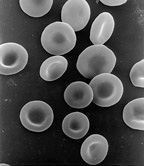 Method of classifying human blood on the basis of the inherited properties of red blood cells (erythrocytes) as determined by their possession or lack of the so-called antigens A (including A1 and A2) and B. Persons may, thus, have type A, type B, type O, or type AB blood. (Antigens of other blood group systems may also be present.) The A, B, and O blood groups were first identified by the Austrian immunologist Karl Landsteiner in 1901.
Method of classifying human blood on the basis of the inherited properties of red blood cells (erythrocytes) as determined by their possession or lack of the so-called antigens A (including A1 and A2) and B. Persons may, thus, have type A, type B, type O, or type AB blood. (Antigens of other blood group systems may also be present.) The A, B, and O blood groups were first identified by the Austrian immunologist Karl Landsteiner in 1901.An antigen is a substance that can, in certain circumstances, excite the production of a corresponding antibody. An antibody is a substance capable of reacting specifically with particular antigens. Blood group antigens are carried on the surface of the red cells. Blood containing red cells with type A antigen on their surface has in its serum (fluid) antibodies against type B red cells. If, in transfusion, type B blood is injected into persons with type A blood, the red cells in the injected blood are destroyed by the antibodies in the recipient's blood. In the same way, type A red cells are destroyed by anti-A antibodies in type B blood.
Type O blood can be injected into persons with type A, B, or O blood unless there is incompatibility with respect to some other blood group system also present. Persons with type AB blood can receive type A, B, or O blood. Blood group O is commonest throughout the world, reaching a frequency of 100 percent in Amerindians of South and Central America and in the southern two-thirds of the United States. Type B is high in Asia, with a maximum in Northern India; it is low in Europe and Africa and absent among American Indians and in most Australian Aborigines. Type A1 is common all over the world and appears to exist to the exclusion of type A2 among the Australian Aborigines and Eskimos and in parts of Indonesia, the Pacific, India, Canada, and the northern United States.
The world high occurs among the Blackfoot and Blood Indians and surrounding tribes in Alberta and Montana; this concentration in a continent otherwise so strongly type O is a puzzle that some scholars believe is evidence for repeated waves of migration into the New World from Asia. Gene A2 reaches a frequency of 50 percent in certain Sami (Lapps); it is uncommon or rare elsewhere. Stomach cancer is 20 percent more frequent in persons of type A than in people of types O or B; pernicious anemia and possibly bronchopneumonia in infants are also associated with type A. Type O is associated with a 40 percent higher frequency of duodenal ulcer, especially in persons who do not secrete water-soluble antigen (nonsecretors); gastric ulcer is also more frequent in type O individuals.
Erythroblastosis fetalis (a type of anemia) occurs in offspring of ABO-incompatible matings, particularly when the mother is O and the father A; early loss of embryos is also increased in ABO-incompatible matings. The ABO antigens are developed well before birth and remain throughout life. ABO antibodies are acquired passively from the mother before birth, but by three months the infant is making his own—it is believed the stimulus for such antibody formation is from contact with ABO-like antigenic substances in nature.
No comments:
Post a Comment